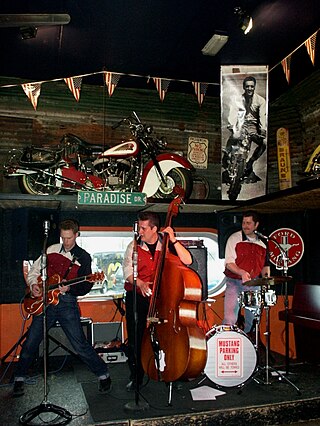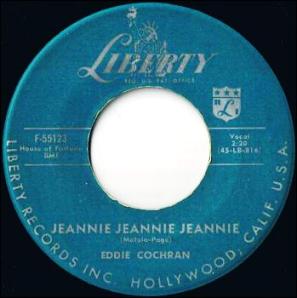Related Research Articles

Ray Edward Cochran was an American rock and roll musician. His songs, such as "Twenty Flight Rock", "Summertime Blues", "C'mon Everybody" and "Somethin' Else", captured teenage frustration and desire in the mid-1950s and early 1960s. Cochran experimented with multitrack recording, distortion techniques, and overdubbing, even on his earliest singles. Cochran played the guitar, piano, bass, and drums. His image as a sharply dressed and attractive young man with a rebellious attitude epitomized the stance of the 1950s rocker, and in death, Cochran achieved iconic status.

Rockabilly is one of the earliest styles of rock and roll music. It dates back to the early 1950s in the United States, especially the South. As a genre it blends the sound of Western musical styles such as country with that of rhythm and blues, leading to what is considered "classic" rock and roll. Some have also described it as a blend of bluegrass with rock and roll. The term "rockabilly" itself is a portmanteau of "rock" and "hillbilly", the latter a reference to the country music that contributed strongly to the style. Other important influences on rockabilly include western swing, boogie-woogie, jump blues, and electric blues.

Liberty Records was a record label founded in the United States by chairman Simon Waronker in 1955 with Alvin Bennett as president and Theodore Keep as chief engineer. It was reactivated in 2001 in the United Kingdom and had two previous revivals.
Memphis soul, also known as the Memphis sound, is the most prominent strain of Southern soul. It is a shimmering, sultry style produced in the 1960s and 1970s at Stax Records and Hi Records in Memphis, Tennessee, featuring melodic unison horn lines, organ, guitar, bass, and a driving beat on the drums.
Southern soul is a type of soul music that emerged from the Southern United States. The music originated from a combination of styles, including blues, country, early R&B, and a strong gospel influence that emanated from the sounds of Southern black churches. Bass guitar, drums, horn section, and gospel roots vocal are important to soul groove. This rhythmic force made it a strong influence in the rise of funk music. The terms "deep soul", "country soul", "downhome soul" and "hard soul" have been used synonymously with "Southern soul".p. 18

"Summertime Blues" is a song co-written and recorded by American rock artist Eddie Cochran. It was written by Cochran and his manager Jerry Capehart. Originally a single B-side, it was released in August 1958 and peaked at number 8 on the Billboard Hot 100 on September 29, 1958, and number 18 on the UK Singles Chart. It has been covered by many artists, including being a number-one hit for country music artist Alan Jackson, and scoring notable hits in versions by Blue Cheer, the Who and Brian Setzer, the last of whom recorded his version for the 1987 film La Bamba, in which he portrayed Cochran.

Yazoo Records is an American record label founded in the mid-1960s by Nick Perls. It specializes in early American blues, country, jazz, and other rural American genres collectively known as roots music.

The Supersuckers are an American rock band, formed in 1988, whose music ranges from alternative rock to country rock to cowpunk. AllMusic describes the band as "the bastard sons of Foghat, AC/DC, and ZZ Top after being weaned on punk rock, unafraid of massive guitar riffs, outsized personalities, or pledging allegiance to sex, weed, and Satan with a wink and a nudge."
Pacific Jazz Records was a Los Angeles–based record company and label best known for cool jazz or West coast jazz. It was founded in 1952 by producer Richard Bock (1927–1988) and drummer Roy Harte (1924–2003). Harte, in 1954, also co-founded Nocturne Records with jazz bassist Harry Babasin (1921–1988).
Morris Eugene Simmons, better known as Jumpin' Gene Simmons, was an American singer and songwriter best known for his 1964 novelty single "Haunted House".
Jerry Neil Capehart was an American songwriter and music manager. Capehart co-wrote the songs "Summertime Blues" and "C'mon Everybody" with Eddie Cochran, whom he also managed. One of his most-recorded songs, "Turn Around, Look at Me," was a chart hit for Glen Campbell, the Lettermen, and the Vogues.
Thomas Baker Knight Jr. was an American songwriter and musician. His best known compositions were "Lonesome Town", "The Wonder of You", and "Don't the Girls All Get Prettier at Closing Time". His songs have been recorded by Ricky Nelson, Paul McCartney, Dean Martin, The Cramps, Elvis Presley, Frank Sinatra, Perry Como, Mickey Gilley, Sammy Davis Jr. and Jerry Lee Lewis.
Orin Glenn Troutman, known professionally as Glen Glenn, was an American rockabilly singer, whose career began in the early 1950s and continued for several decades.
Richard Earl D'Agostin, was an American dancer and rock and roll musician, best known for touring with Eddie Cochran. D'Agostin was a singer, songwriter, pianist, guitarist, and harmonist; and the frontman of Dick D'Agostin & The Swingers.
"Tryin' to Get to You" is a song written by R&B singer songwriters Rose Marie McCoy and Charles Singleton. It was originally recorded by the Washington DC vocal group The Eagles in 1954 and released in mid-1954 on Mercury Records 70391. The format of the title on The Eagles’ record was “Tryin’ to Get to You”, with an apostrophe.

"Weekend" is a song recorded by Eddie Cochran. The song was written by Bill and Doree Post and recorded in April 1959.

"Jeannie Jeannie Jeannie" is a song by Eddie Cochran recorded and released as a single in January 1958 on Liberty Records 55123. It was a minor hit for Cochran and stalled at number 94 on the Billboard charts. "Jeannie, Jeannie, Jeannie" was posthumously released in the United Kingdom in 1961 on the London Records label and rose to number 31. Later versions are most commonly known as "Jeanie, Jeanie, Jeanie". The song was first written as "Johnny, Johnny, Johnny" for The Georgettes, but they never recorded it.

"Drive In Show" is a song originally performed by Eddie Cochran and released on single by Liberty Records in July 1957. "Drive In Show" backed with "Am I Blue" rose to number 82 on the Billboard charts.
Dan Terry was an American big band leader, arranger, and trumpet and flugelhorn player who appeared at Birdland, the world-famous jazz club, with Dinah Washington, Sarah Vaughan, Chris Connor, Johnny Smith, and other jazz luminaries.
Crest Records was a subsidiary record label of music publisher American Music owned by Sylvester Cross.
References
- ↑ "Label: Ekko Records - Rate Your Music". Rateyourmusic.com. Retrieved 2020-04-06.
- ↑ "Eddie Cochran connection". Pcuf.fi. Retrieved 2020-04-06.
- ↑ "Ekko (Calif.) (RCS Label Listing)". Rcs-discography.com. Retrieved 2020-04-06.
- ↑ "45 Discography for Ekko Records". Globaldogproductions.info. Retrieved 2020-04-06.